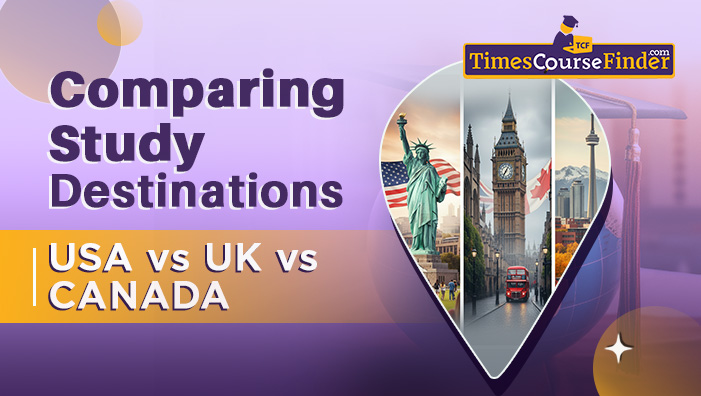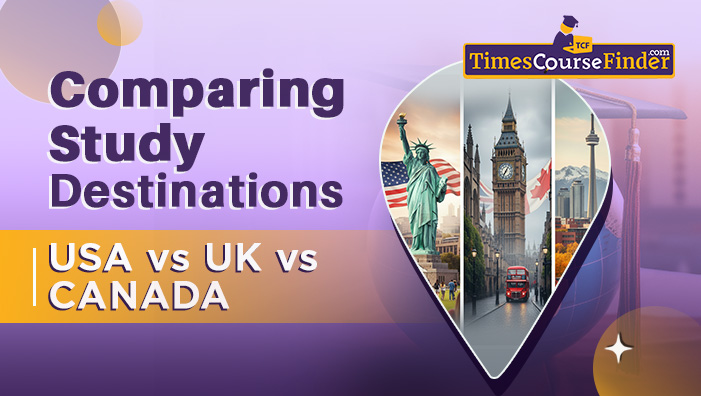
Study Abroad Comparison: USA vs UK vs Canada 2025
Choosing between studying in the USA, UK, or Canada? This guide compares education systems, tuition costs, work options, and visa benefits to help you decide which destination suits your academic and career goals.
 TCF SEO
TCF SEO 
Choosing where to pursue higher education is a significant decision for international students. Among the most popular destinations are the USA, UK, and Canada, each offering high-quality education, multicultural campuses, and post-study work opportunities. But when it comes to deciding between them, the comparison isn’t always straightforward.
This guide takes a closer look at key differences and similarities to help students better understand the study in USA vs UK and the study in USA vs Canada debate.
Table of Content
Education Quality and Teaching Style
University Rankings and Global Reputation
Cultural Experience and Student Life
Choosing Based on Career Goals
1. Education Quality and Teaching Style
USA
The USA education system is known for flexibility. Students can customize their degree by combining majors and minors, and they often spend the first year exploring different courses before declaring a major. Programs focus on research, innovation, and critical thinking.
To understand more about the system, check out: Education System
UK
In the UK, degrees are often shorter and more specialized. Undergraduate programs typically last three years, with students focusing on their chosen subject from day one. The teaching style is academically rigorous and lecture-based with strong independent study components.
Canada
Canadian universities strike a balance between the U.S. and UK models. Programs tend to offer flexibility in the early years, but with a more straightforward progression path. Education in Canada emphasizes research and practical knowledge, particularly in the science and technology fields.
2. University Rankings and Global Reputation
USA
The university ranking USA UK, and Canada comparison consistently shows U.S. institutions leading global charts. Universities like MIT, Harvard, Stanford, and Princeton often take top spots worldwide.
See more about leading institutions here: Top Universities in the USA
UK
The UK is home to historic and globally respected universities such as Oxford, Cambridge, and Imperial College London. These institutions regularly feature in global top 10s and are known for academic depth and tradition.
Canada
Canada’s universities are growing in global influence, with institutions like the University of Toronto, McGill University, and the University of British Columbia gaining recognition for research excellence and inclusivity.
3. Cost of Studying and Living
Tuition
- USA: Tuition fees vary widely but are often highest among the three. Private universities can cost $35,000–$60,000 annually, while public universities range from $20,000–$35,000.
- UK: International student tuition ranges from £10,000 to £26,000 per year, depending on the course and institution.
- Canada: More affordable overall, Canadian universities charge between CAD 20,000 and CAD 35,000 per year for most undergraduate programs.
Living Costs
- USA: Living expenses vary by state and city, with urban areas like New York or California costing significantly more.
- UK: London and southeast England are more expensive, while cities in the north are generally more affordable.
- Canada: Costs are moderate, with cities like Montreal and Halifax offering affordable living options compared to Vancouver or Toronto.
4. Post Study Work Opportunities
USA
Students can apply for Optional Practical Training (OPT) after graduation for 12 months for most programs, and up to 36 months for STEM degrees. This hands-on work experience often leads to employer-sponsored visas.
UK
The Graduate Route allows international students to stay and work in the UK for two years (or three for PhD graduates) after completing their studies, offering a straightforward post-study path.
Canada
Canada’s Post-Graduation Work Permit (PGWP) allows students to work for up to three years after finishing their degree. Work experience gained during this period can contribute toward permanent residency eligibility, making Canada an attractive long-term option.
5. Visa Policies and Immigration
- USA: The F-1 visa allows students to stay during their study period, with OPT providing temporary work rights post-graduation.
- UK: The student visa is valid for the duration of the program, with opportunities to switch to work or skilled worker visas later.
- Canada: The student visa includes limited work rights during study, with a clear transition to PGWP and permanent residence pathways through programs like Express Entry.
6. Cultural Experience and Student Life
All three countries offer inclusive campuses, cultural exposure, and active student life. However, there are differences in how students experience life outside the classroom:
- USA: Diverse and large campuses with broad extracurricular options. Many universities have extensive support systems for international students.
- UK: Strong academic communities with a rich history and tradition. Students often live in college-managed housing, especially in their first year.
Canada: Welcoming and safe cities, a high quality of life, and strong multiculturalism are especially beneficial for students seeking long-term settlement.
7. Choosing Based on Career Goals
When comparing career outcomes, the USA offers vast industry connections and corporate partnerships, especially in tech, healthcare, finance, and engineering. UK graduates benefit from access to European markets and global recognition in law, arts, and social sciences. Canadian universities are known for connecting students to research and innovation hubs, especially in environmental science, engineering, and healthcare.
Suppose your goal is global mobility and long-term work. In that case, all three countries provide viable pathways, though Canada's immigration-friendly structure gives it an edge for students focused on permanent residence.
Conclusion
So, study in USA vs UK or study in USA vs Canada, which is better? It depends on your priorities:
- Choose the USA for flexible academics, high-ranking universities, and strong post-study work in STEM fields.
- Consider the UK for shorter, focused degrees and globally respected academic traditions.
- Opt for Canada if you're looking for affordability, balanced academics, and immigration-friendly policies.
Every country offers excellent education and career value. Your choice should reflect your academic goals, financial plans, and long-term ambitions.
Need help deciding based on your field of study or budget? Talk to our consultants here for personalized guidance.
FAQs
- Which country is better for study, USA or Canada?
Both are top choices — the USA offers flexibility, world-ranked universities, and vast internship options, while Canada provides affordable education, strong research programs, and clear permanent residency pathways.
- Which is better to study in, the UK or USA?
The UK has shorter, focused degrees with strong academic tradition, while the USA allows flexible course selection and longer post-study work time through OPT. Your choice depends on budget, duration, and career goals.
- Which country is best for study, Canada or the UK?
If you want affordability and PR options, Canada is ideal. If you prefer historic universities and fast-track degrees, the UK is better. Both offer high-quality education and diverse international campuses.
- Why study in the USA, why not the UK or Canada?
Studying in the USA gives you access to the world’s best universities, flexible academics, and unmatched research and networking opportunities. It’s ideal for innovation-driven fields like technology, engineering, and business.




